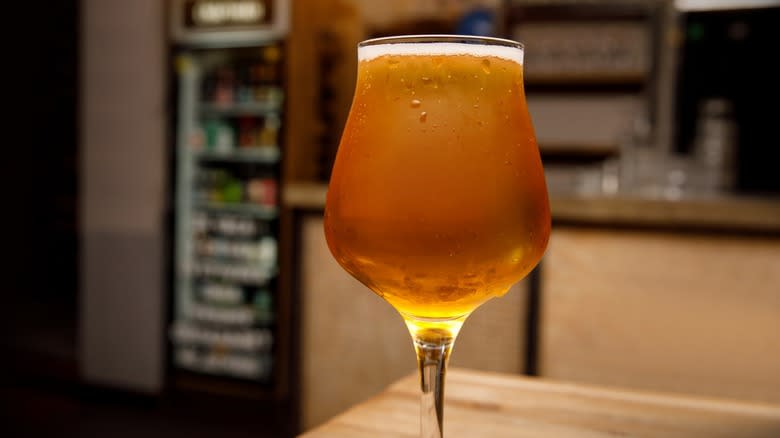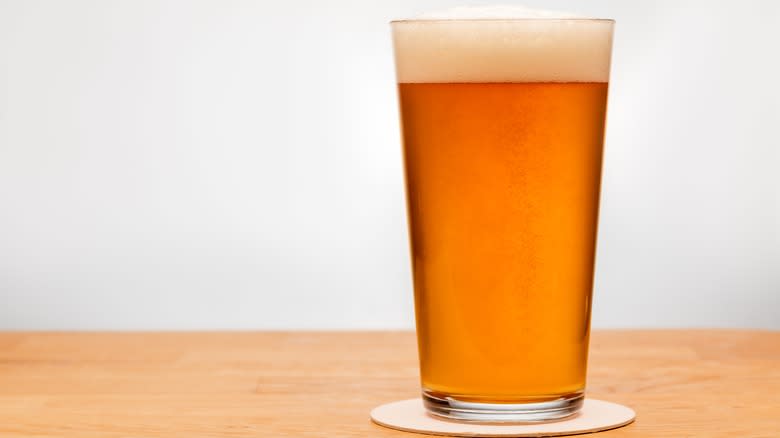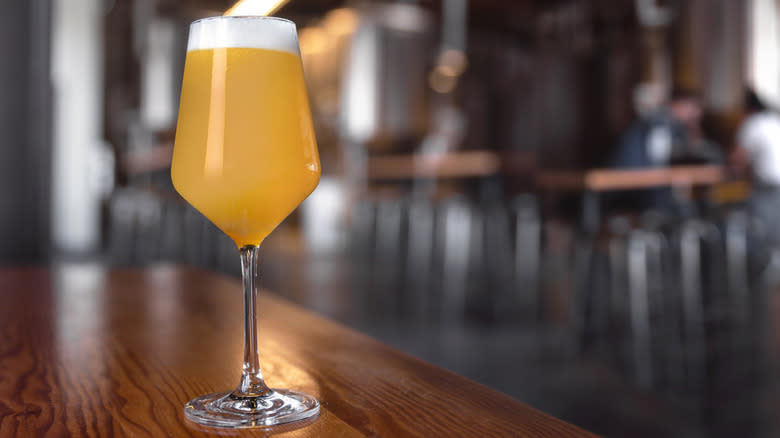Switch Things Up And Drink Your Next Beer From A Wine Glass

If you go to any garden variety bar in the United States and order a beer, chances are, your bartender will serve it to you in a pint glass. So, while you could certainly be forgiven for assuming that a standard pint glass is the optimal serving vessel for beer, it isn't. If you're drinking at home, you'll have a better overall experience if you pour your beer into a wine glass.
For both beer and wine, there is a whole array of glassware out there, with different shapes meant to best accommodate different wine varietals or beer styles. If you're a real beverage (or glassware) nerd, by all means, start building up your collection with unique glasses for India Pale Ales, pilsners, Scotch ales, and more. But for everyday enjoyment, there's no need to drop fat stacks on glassware just to enjoy a cold one.
A simple wine glass is actually a superior choice for drinking beer, for many of the same structural reasons that it's the preferred choice for wine. The shape of the glass is great for developing and maintaining aromas and carbonation, and the stem lets you hold it without warming up the beverage inside.
Read more: 10 Of The Healthiest Beers You Can Drink
Take A Pass On The Pint

The kind of pint glass with which you're probably most familiar is the shaker pint, with its straight, curveless sides and slight downward taper. But the shaker pint wasn't initially designed as a beer glass -- it's just half of a Boston shaker, a common tool for shaking up cocktails. The shaker pint glass only really became a standard for serving beer because it was already on hand at bars and restaurants, it was sturdy, and it did an all right job keeping beer cold.
If you order a beer abroad -- especially in places like Germany or Belgium that have robust beer traditions -- you're more likely to have your beer served in a style-specific glass. Narrow, tall glasses (such as stange glasses) are used for delicate styles with subtle flavor notes, like a K?lsch. Goblets or chalice-style glasses are used to serve strong, complex beers like double IPAs and Belgian-style beers. Finally, tall, curved glasses (such as weizen glasses) are used for fluffy, foamy wheat beers.
All of these glasses serve to highlight the distinctive features of a beer, but at the end of the day, they're all doing the same thing. They all showcase the smell of a beer without releasing too much of it too quickly. They help create that fluffy head of carbonation that protects the beer from quickly oxidizing and depreciating in flavor and scent.
Wine About It

The very broad mouth of a shaker pint allows the head, as well as the aromas, to dissipate more quickly. Wine glasses have a smaller surface area at the mouth, which preserves the head but still offers a wide enough opening for you to easily enjoy the taste and smells. Wine glasses (like many proper beer glasses) also often taper slightly towards the mouth, which helps trap the aromas given off by a beer. And, as any brewer will tell you, the smell is nearly half the experience.
But the best benefit of drinking beer from a wine glass has got to be the stem. With few exceptions, we Americans tend to like our beer cold. When you hold a glass directly in your hand -- especially something like a shaker pint that requires all five fingers -- your body heat starts to slowly warm the drink inside. Instead, hold your glass by the stem to keep the actual drink cold for as long as possible.
Read the original article on Daily Meal.